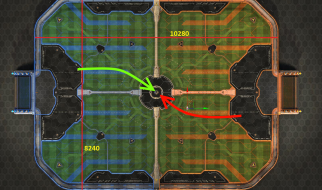 by Chris Panatier
by Chris Panatier
It is necessary to begin by noting that the term ?state of nature? does not appear in the Leviathan, Hobbes has chosen to make use of a different term to refer to the same concept, namely ?the natural condition of mankind?[1]. However, here I will refer to both concepts as the state of nature in order to avoid conceptual disorientation.
The significance of the state of nature cannot be understated because it constitutes the basis of both Hobbes and Locke?s theories of political authority and is reminiscent of their reflections on such notions as equality, liberty, morality and so on. Although their basis is the same, Hobbes?s conceptualisation of the state of nature differs greatly from that of Locke. This difference elucidates their notably incompatible reasoning for the advent of civil society and for the means through which this transition can be achieved.
Hobbes and Locke similarly used the state of nature as an hypothetical condition with the purpose of explaining the need for a social contract, which precipitates the establishment of a legitimate political body.
However, their notions of the state of nature cause them to reach distinct and opposing conclusions in terms of the kind of government that ought to be formed. Locke views the state of nature more positively and presupposes it to be governed by natural law. He differentiates the state of nature from the state of war, unlike Hobbes who conceives the state of nature per se as equivalent to the state of war. Hobbes believes that the characteristics of the state of nature inevitably cause men to ?endeavour peace?[2].
It is crucial to mention Hobbes?s and Locke?s opposing theories of human nature and the motives underlying this juxtaposition. Hobbes emphasises the free and equal condition of man in the state of nature, as he states that ?nature hath made men so equal in the faculties of mind and body?the difference between man and man is not so considerable.?[3] However, Hobbes makes it very explicit early in the Leviathan that the ramifications of equality are extremely negative. That is to say, Hobbes believes that natural equality makes everyone dangerous to each other. This belief derives from Hobbes?s perception that there is an inextricable link between equality and hostility, which generates continuous conflicts amongst men.
Hobbes underlines this by saying that ?if any two men desire the same thing, which nevertheless they cannot both enjoy, they become enemies, and in the way to their End, ? endeavour to destroy, or subdue one another?[4]. This quotation indicates that Hobbes was possessed of a radically pessimistic understanding of human nature. At first glance, Locke?s characterization of man in the state of nature might be perceived as akin to that of Hobbes.
Locke also stresses the idea that man is endowed with freedom and equality by nature, which thus causes the state of nature to be a state of sheer freedom and equality, in which no one is subordinated to the other and there is no supreme authority. In Second Treaties, Locke appears to rely on natural theology in his depiction of human nature, due to his engagement with the Scientific Revolution of the seventeenth-century. This caused him to believe that men in the state of nature are governed by Reason, which he also calls ?the Law of Nature?[5]. For Locke, the content of natural law consists of God?s purposes, because after all, men are the property of God. Therefore, he asserts that a man, ?has not Liberty to destroy himself, or so much as any Creature in his Possessions?[6]. This is also significant to Locke?s belief that not only is every individual?s right of self-preservation ensured by the natural law but that mutual preservation is also a moral duty.
In light of Locke?s understanding, it appears that Reason intrinsically produces a sense of morality in men and makes them capable of differing the righteous from the wicked within the principles of natural law. In other words, individuals are able to realise which behaviours are admissible and which are not in the state of nature. Thus, in Locke?s exact words it is ?a State of perfect Freedom to order their [men?s] Actions and dispose of their Possessions, and Persons as they think fit, within the bounds of the Law of Nature?[7]. That is to say that although men are equal and free in the state of nature, there are binding laws in this state, which serve to protect one?s life and properties. Hobbes is not as much of a believer in the natural theology as his counterpart, which caused him to develop a different understanding of Reason and natural law. In this regard, Hobbes rejects the sense of morality found in Locke, which derives from the moral philosophy of the ancients. One way to consider Hobbes?s version of the state of nature is that it is quintessentially amoral, since he declares that ?in the condition of men that have no other Law but their own Appetites, there can be no general Rule of Good, and Evill Actions?[8]. This makes it clear that Hobbes, as an enthusiast for New Science, refutes the idea that a traditional sense of morality is intrinsic to men. Individuals are not capable of determining their acts and realising what is right or wrong, simply because these concepts have no meaning or value in the state of nature. Hobbes perceives man as an embodiment of his ?passions, desires and aversions?[1], which means that they will often act in accordance with their interests and pleasures, the primary one being self-preservation.
The state of nature is therefore a state of license for Hobbes because he delineates it as a state in which ?every man has a Right to every thing; even one anothers body?[9]. Hobbes subsequently argues that ?as long as this naturall Right of every man endureth, there can be no security to any man?[10] in the state of nature. This indicates that the state of nature has an appalling connotation for Hobbes, which causes him to essentially conceive this state as a state of war. For him, it is a state of endless conflict, disorder and violence because everyone can benefit from unlimited liberty and thus no one can be sure of self-preservation. The difficulty arises from having to preserve peace in this state, in which ?first, competence, secondly, diffidence and thirdly, glory?[11] influence men in doing whatever it takes to achieve dominance over the others for the sake of preserving themselves. The significance of self-preservation in the Leviathan cannot be underestimated, as Hobbes argues that the constant fear of death puts man?s desire for self-preservation in tremendous jeopardy. This fear is the main perpetuator of the state of war, which causes individuals to come to the conclusion that they need certain laws to end this fear. Hobbes asserts that these laws, understood through reason, tell man to seek peace and abandon the state of war in order to ensure self-preservation. However, this can only be established after one?s individual process of reasoning is transformed into a collective rationality, which then leads people to abandon the state of nature altogether. After men manage to leave this brutal state, the following law of nature that is simply based on barter entails the surrendering of men?s absolute freedom in the state of nature to a Sovereign ruler, in exchange of their safety. The creation of the famous social contract then appears amongst men, as Hobbes?s third natural law suggests that ?men perform their covenants made?[12]. Given the characteristics of Hobbes? state of nature, it is clear that the collective rationality necessary to overcome the state of war cannot be achieved, unless there is an absolute sovereign to enforce the boundaries, punish the transgressors and thus to perpetuate the covenant. Contrary to Hobbes?s unitary understanding, Locke clearly differentiates the state of nature and the state of war by asserting that the former is a state of ?peace, goodwill, mutual assistance, and preservation?[13] and the latter is a state filled with ?enmity, malice, violence, and mutual destruction.?[14]. Crawford B. Macpherson argues, however, that this distinction, although plainly outlined by Locke, is in fact highly equivocal.[15] In the Second Treaties, Locke explains this transition as the following:
Men living together according to reason, without a common Superior on Earth, with Authority to judge between them, is properly the State of Nature. But force, or a declared designed of force upon the Person of another, where there is no common Superior on Earth to appeal to for relief, is the State of War (Locke, 1823, p. 113).
As this quotation indicates, Locke acknowledges a transition into the state of war, which presumably occurs when individuals fail to direct their behaviours in compliance with the law of nature (or Reason, since they are interchangeable to Locke). The state of nature is not a state of license for Locke, because everyone is eligible to execute the natural law when it comes to penalising those who prompt a transition into the state of war. However, no one can be the judge of his own case, since one?s emotions such as self-love and revenge cause him to be biased and apply disproportionate measures of punishment, which would be unjust. Macpherson is fair to throw into question Locke?s separation because the absence of an unbiased judge is fundamental to the state of nature.
This indicates, to a great extent, that the state of nature and the state of war are ultimately not as different as they may initially appear. The former must lead to the latter due to the crucial need for an impartial authority to appeal to when solving conflicts in the state of nature.
Having examined the ways in which Locke and Hobbes conceive the state of nature, one can conclude that though some of their ideas are similar, there is a myriad of great differences in their understanding of the state of nature.
For instance, Locke perceives the law of nature to preside over the state of nature, in which individuals and their properties are not necessarily in constant danger. Conversely, Hobbes?s state of nature is the state of war, which cause men to come to the conclusion that they must always be in pursuit of peace.
Furthermore, both Locke and Hobbes develop a similar understanding in that the natural law serves to ensure self-preservation. However, whereas Locke argues that it is rightful for individuals to execute the law in order to punish the culprit, Hobbes believes that the one and only way to impose the law is the surrender of power to a Leviathan, who can successfully provide security. I argue that all these differences between each author?s hypothesis of the state of nature derive, to a great extent, from their dissimilar conceptualisations of human nature.
Both of the authors ultimately suggest the establishment of a superior authority, namely an impartial judge for Locke and and an absolute ruler for Hobbes, in order to cope with the issues originating in the state of nature, which can be achieved by means of the establishment of a social contract. However, this shift in power as a consequence of this pre-societal state does not follow the same course for Locke and Hobbes. This is because two philosophers entirely disagree on the form of government that should be constructed and the kind of agreement that should be endorsed by individuals.
For Locke, the turmoil of the state of nature arises from the fact that each and every person is a judge in his own right, which makes it crucial to establish a social contract amongst men in order to pursue justice. However, this can only occur by the consent of all individuals, as Locke states that ?it is not every compact that puts an end to the state of Nature between men, but only this one of agreeing together mutually to enter into one community??[16]. This is because Locke refuses a top-down change in the condition of free and equal men in the state of nature and rather perceives his pre-societal men as being committed to renouncing their freedom for the sake of common well-being, safety and peace. Locke envisions constitutional monarchy as an ideal form of government because power remains in the hands of the individuals, at least to a certain extent.
The crucial role that the concept of property plays in the evaluation of Locke?s accountshouldnotbeignored. Even though men acquire property in the state of nature, it can never be insured without men abandoning their own power to a civil government that can legitimately ensure justice and protect their natural rights as well as properties. Unlike the pivotal role of property in Locke, such a concept cannot be found in Hobbes?s state of nature, since ownership is simply impossible given the conditions of this state. This leads Hobbes to focus more on the preservation of people?s lives rather than their property in justifying his legitimate political body. Hobbes also imagines a type of social contract which leads men to put an end to the state of war and transform their community into a civil society. However, the form of government that Hobbes favours is an utterly coercive one, due to his aforementioned negative view of natural human condition. The absolute power of this government is the only means by which the conflicts caused by hostile human nature may be put to an end. Individuals surrender their perfect freedom and subject themselves to a Sovereign who determines all the rules and decides what is just or unjust within society. The covenant made by individuals thus authorises Hobbes?s Leviathan to enact legislations and enforce them with the sole purpose of ensuring peace and prosperity. It is apparent that the core precepts of Hobbes?s ideal system are force and coercion, which serve to intimidate individuals in order to prevent them from violating the contract. The last but not least important difference between Hobbes and Locke is that, in Locke?s terms, if the government itself becomes a transgressor of the natural law, it loses its legitimacy, as Locke asserts:
Whenever any one shall go about to bring them into such a slavish condition, they will always have a right ? to rid themselves of those who invade this fundamental law of self-preservation, ?And thus the community may be said in this respect to be always the supreme power (Locke, 1823, p. 170).
Locke clearly asserts that it is lawful for individuals to revolt against a corrupt government and eventually overthrow it, since it has a constitutional rather than an absolute power. However, Hobbes?s view is far more controversial because he believes that when individuals submit to their Sovereign and abandon their right to rule themselves, they also cede their right to rise up against their Sovereign, since this would be an unjust act, which would thus break the covenant. Jean Hampton addresses this in Hobbes and the Social Contract Tradition and highlights the implausibility of revolution in Hobbes?s account. She asserted that ?for people to authorize an absolute sovereign while at the same time reserving to themselves the right to resist under certain circumstances?[17] is impossible. This indicates that Hobbes?s men voluntarily turn the state of nature into an absolutely authoritarian society by creating a social contract.
It is evident that both authors use this concept as the basis for their political theory. They both emphasise the crucial need for a covenant between individuals and the government established thereafter. Their ideal types of government, however, are almost certainly irreconcilable because absolutism, which Hobbes explicitly favours, is entirely disapproved of by Locke.
Locke puts a great deal of emphasis upon the desire for a limited government, which can provide justice whilst also preserving human nature as it is. Hobbes entirely juxtaposes this, as he asserts that government must obtain as extensive power as possible as a means for countervailing the natural condition of humans and thus ensuring security.
The comparison shows that their theories contradict one another on very key issues such as human nature, the social contract, the form of government and so on. Even though each of the philosophers is fairly consistent in his own account, their stances are almost entirely antithetical.
Bibliography
1. Black, Sam. 1977. ?Science and Moral Skepticism in Hobbes?. Canadian Journal Philosophy, Vol. 27, ?2. pp. 173?207.
2. Hampton, Jean. 1986. Hobbes and the Social Contract Tradition (Cambridge: Cambridge University Press).
3. Hobbes, Thomas and Rod Hay. 1999. Leviathan, Or, The Matter, Forme, And Power Of A Common-Wealth, Ecclesiasticall And Civill. 1st ed. (Hamilton, Ont.): (McMaster University).
4. Hhne, Thomas. 2012. ?The state of nature? in John Locke, Thomas Hobbes and Jean-Jacques Rousseau. (Munich: GRIN Verlag).
5. Locke, John and Rod Hay. 2000. Two Treatises Of Government. 1st ed. (Hamilton, Ont.): (McMaster University).
6. Macherson, Crawford. B. 1962. The Political Theory of Possessive Individualism: Hobbes to Locke. (Clarendon Press).
[1] Hobbes (1951), p. 76.
[2] Hobbes (1951), p. 80.
[3] Hobbes (1951), p. 76.
[4] Hobbes (1951), p. 76
[5] Locke (1823), p. 66.
[6] Locke (1823), p. 107.
[7] Locke (1823), p. 129.
[8] Hobbes (1951), p. 425.
[9] Hobbes (1951), p. 80.
[10] Hobbes (1951), p. 80.
[11] Hobbes (1951), p. 77.
[12] Hobbes (1951), p. 88.
[13] Locke (1823), 113.
[14] Locke (1823), 113.
[15] Macpherson (1962), p. 238.
[16] Locke (1823), 111.
[17] Hampton (1986), p. 197.


